The gig economy has been rapidly transforming the employment landscape in India, offering flexible work opportunities across various sectors. As the demand for freelance and contractual work rises, numerous startups have emerged to facilitate this shift. Here’s a detailed look at the top 10 gig economy startups in India that are leading the charge.
India, with its vast population and rapidly expanding internet penetration, has become a fertile ground for gig economy startups. These companies not only cater to urban populations but also increasingly reach semi-urban and rural areas, thereby democratizing access to various services. The gig economy appeals to a broad spectrum of workers, including students, homemakers, part-time job seekers, and even full-time professionals looking for additional income streams.
1. UrbanClap (now Urban Company):
Overview: UrbanClap, rebranded as Urban Company, is one of India’s largest home services platforms. Founded in 2014 by Abhiraj Bhal, Varun Khaitan, and Raghav Chandra, it connects users with professionals offering services like beauty treatments, cleaning, plumbing, carpentry, and more.
Key Features:
- Wide Range of Services: From beauty and wellness to home repairs and maintenance.
- Quality Assurance: Strict vetting process for service providers.
- Convenience: Easy booking and payment options via app and website.
Impact: Urban Company has revolutionized home services by bringing professionalism and reliability to the forefront, making it a household name in major Indian cities.
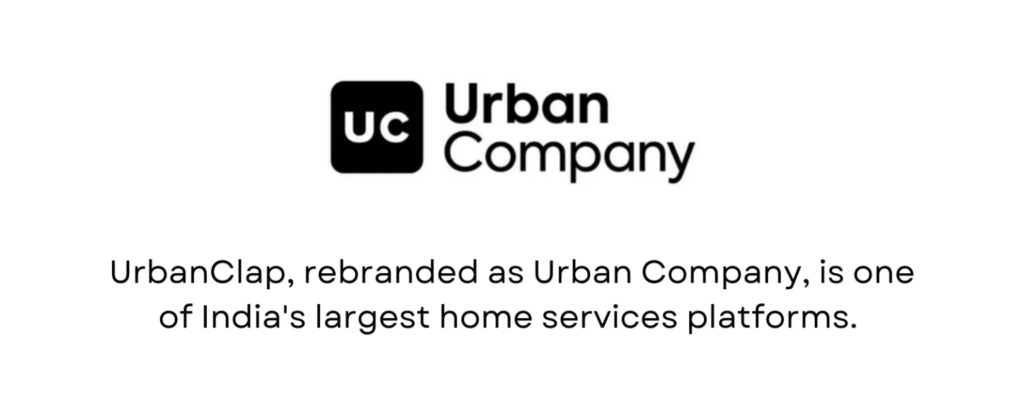
UrbanClap (now Urban Company)
| Aspect | Details |
|---|---|
| Founded | 2014 |
| Founders | Abhiraj Bhal, Varun Khaitan, Raghav Chandra |
| Location | Gurgaon, Haryana, India |
| Services Offered | Beauty treatments, cleaning, plumbing, carpentry |
| Key Features | Wide range of services, quality assurance, convenience |
| Impact | Revolutionized home services, created numerous gig jobs |
| Website | Urban Company |
Also Read: Top 10 SpaceTech Startups in india
2. Swiggy:
Overview: Founded in 2014 by Sriharsha Majety, Nandan Reddy, and Rahul Jaimini, Swiggy is a leading food delivery platform that leverages gig workers to deliver food from restaurants to customers.
Key Features:
- Efficient Delivery Network: Utilizes a vast network of delivery partners.
- User-Friendly App: Easy-to-use interface for ordering food.
- Promotions and Discounts: Regular offers to attract customers.
Impact: Swiggy has significantly contributed to the growth of the food delivery sector, creating numerous jobs for gig workers while ensuring timely and efficient service.
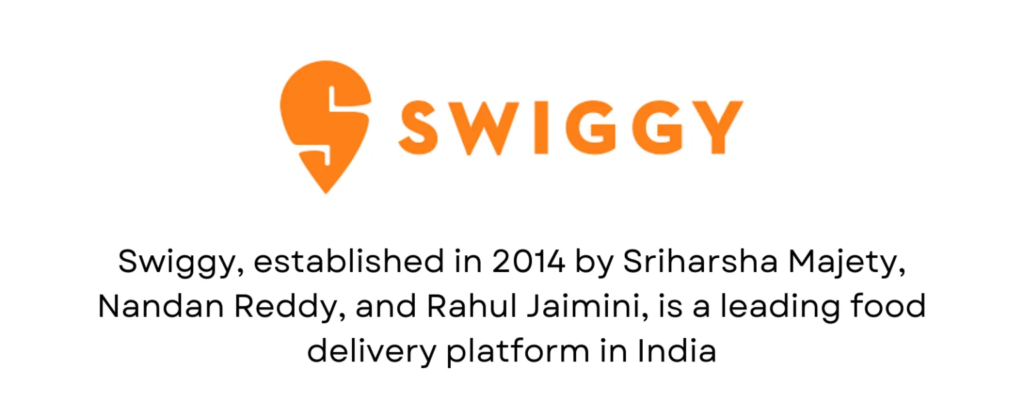
Swiggy
| Aspect | Details |
|---|---|
| Founded | 2014 |
| Founders | Sriharsha Majety, Nandan Reddy, Rahul Jaimini |
| Location | Bangalore, Karnataka, India |
| Services Offered | Food delivery |
| Key Features | Efficient delivery network, user-friendly app, promotions and discounts |
| Impact | Growth of food delivery sector, creation of gig jobs |
| Website | Swiggy |
Also Read: Top 10 Steel Companies In India
3. Ola:
Overview: Ola, founded by Bhavish Aggarwal and Ankit Bhati in 2010, is a ride-hailing service that connects drivers with passengers. It has expanded its services to include Ola Auto, Ola Bike, and even Ola Electric.
Key Features:
- Multiple Transport Options: Offers a range of vehicles, including cars, bikes, and autos.
- Safety Features: In-app SOS button and real-time tracking.
- Cashless Transactions: Supports multiple payment modes.
Impact: Ola has not only provided convenient transportation options but also created a substantial number of gig jobs for drivers across India.
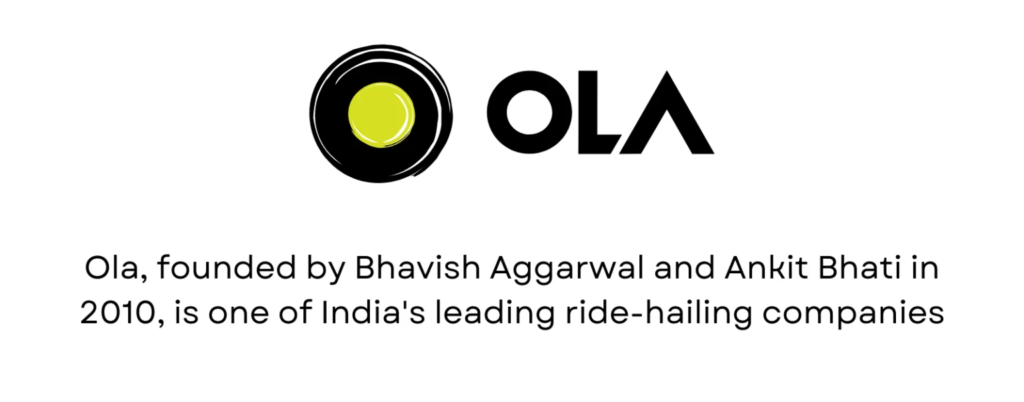
Ola
| Aspect | Details |
|---|---|
| Founded | 2010 |
| Founders | Bhavish Aggarwal, Ankit Bhati |
| Location | Bangalore, Karnataka, India |
| Services Offered | Ride-hailing, auto, bike, electric vehicles |
| Key Features | Multiple transport options, safety features, cashless transactions |
| Impact | Convenient transportation, substantial gig jobs for drivers |
| Website | Ola |
Also Read: Top 10 Blockchain Startups in india
4. Zomato:
Overview: Founded in 2008 by Deepinder Goyal and Pankaj Chaddah, Zomato started as a restaurant discovery platform and evolved into a major food delivery service.
Key Features:
- Comprehensive Database: Detailed information on restaurants and user reviews.
- Food Delivery Service: Efficient delivery through gig workers.
- Zomato Gold: Subscription service offering exclusive benefits.
Impact: Zomato has transformed how people discover and enjoy food, offering significant employment opportunities in the gig economy through its delivery network.
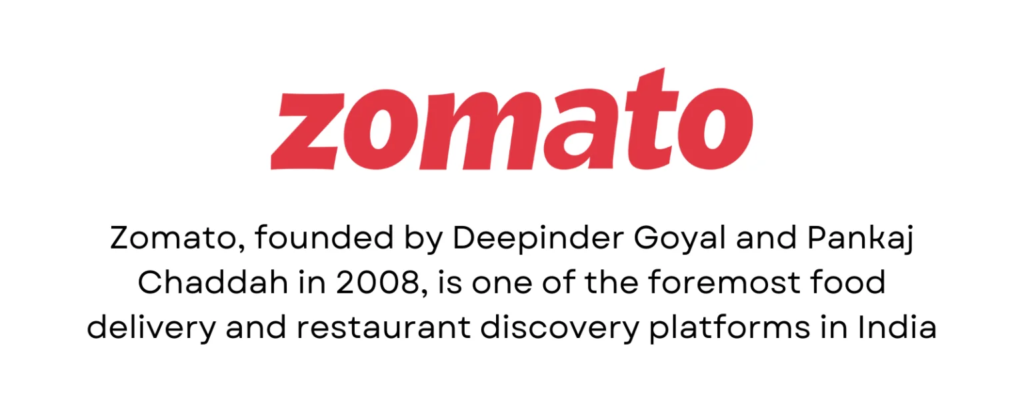
Zomato
| Aspect | Details |
|---|---|
| Founded | 2008 |
| Founders | Deepinder Goyal, Pankaj Chaddah |
| Location | Gurgaon, Haryana, India |
| Services Offered | Restaurant discovery, food delivery |
| Key Features | Comprehensive database, food delivery, Zomato Gold |
| Impact | Transformed food discovery, significant gig jobs for delivery network |
| Website | Zomato |
Also Read: Top 10 IoT Startups in india
5. Dunzo
Overview: Dunzo, co-founded by Kabeer Biswas, Dalvir Suri, Mukund Jha, and Ankur Aggarwal in 2015, is a hyperlocal delivery service that delivers anything from groceries to documents.
Key Features:
- On-Demand Delivery: Delivers almost anything within a city.
- 24/7 Service: Available round the clock.
- Quick Delivery: Promises fast delivery times.
Impact: Dunzo has made everyday errands easier for urban residents while creating numerous gig jobs for delivery partners.

Dunzo
| Aspect | Details |
|---|---|
| Founded | 2015 |
| Founders | Kabeer Biswas, Dalvir Suri, Mukund Jha, Ankur Aggarwal |
| Location | Bangalore, Karnataka, India |
| Services Offered | Hyperlocal delivery |
| Key Features | On-demand delivery, 24/7 service, quick delivery |
| Impact | Simplified urban errands, numerous gig jobs for delivery partners |
| Website | Dunzo |
Also Read: Top 10 Mental Health startups in India
6. TaskBob:
Overview: TaskBob, founded by Aseem Khare in 2014, is a home services startup providing handyman services like cleaning, repairs, and maintenance.
Key Features:
- Professional Services: Trained and verified professionals.
- Easy Booking: App-based service booking.
- Customer Support: Robust customer service for issue resolution.
Impact: Although TaskBob ceased operations in 2017, it played a crucial role in popularizing app-based home services in its operational years.

TaskBob
| Aspect | Details |
|---|---|
| Founded | 2014 |
| Founders | Aseem Khare |
| Location | Mumbai, Maharashtra, India |
| Services Offered | Handyman services |
| Key Features | Professional services, easy booking, customer support |
| Impact | Popularized app-based home services (ceased operations in 2017) |
| Website | TaskBox |
Also Read: Top 10 Robotics Startups in india
7. Housejoy:
Overview: Founded in 2014 by Sunil Goel and Arjun Kumar, Housejoy offers a range of home services including beauty, maintenance, and repair services.
Key Features:
- Diverse Services: From beauty treatments to home repairs.
- Quality Assurance: Background-checked professionals.
- Convenient Booking: User-friendly app and website.
Impact: Housejoy has made home services accessible and reliable, contributing to the gig economy by employing numerous service professionals.

Housejoy
| Aspect | Details |
|---|---|
| Founded | 2014 |
| Founders | Sunil Goel, Arjun Kumar |
| Location | Bangalore, Karnataka, India |
| Services Offered | Home services, beauty, maintenance, repairs |
| Key Features | Diverse services, quality assurance, convenient booking |
| Impact | Made home services accessible and reliable, contributing to gig economy |
| Website | Housejoy |
Also Read: Top 10 Virtual Reality Startups in india
8. GigIndia:
Overview: GigIndia, founded by Sahil Sharma and Aditya Sachdeva in 2017, is a platform that connects businesses with on-demand workforces for tasks such as telecalling, field surveys, and marketing.
Key Features:
- Flexible Work: Offers various gig jobs suited to freelancers.
- Scalable Solutions: Helps businesses scale operations quickly.
- Skill Development: Provides training for gig workers.
Impact: GigIndia has empowered freelancers by offering flexible job opportunities and helping businesses with scalable workforce solutions.
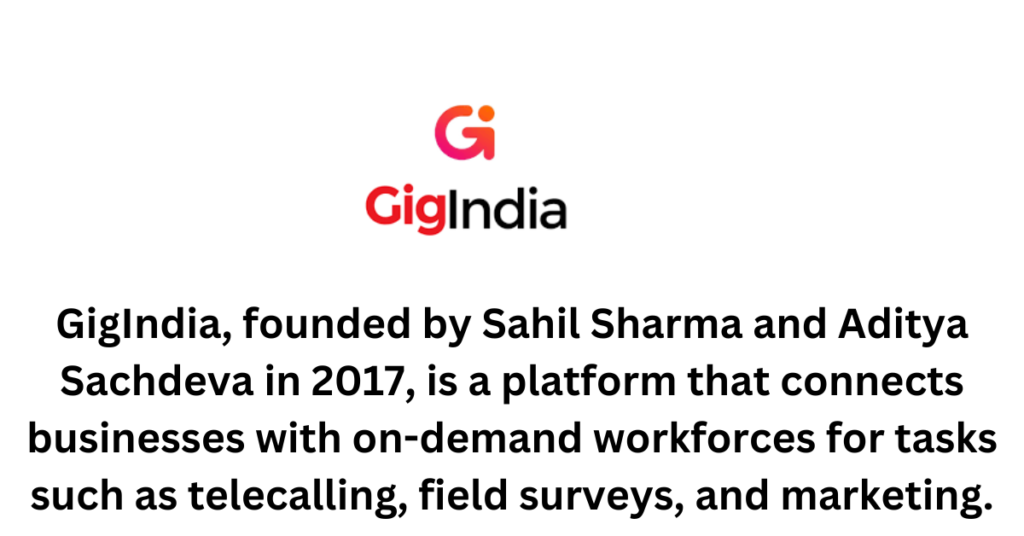
GigIndia
| Aspect | Details |
|---|---|
| Founded | 2017 |
| Founders | Sahil Sharma, Aditya Sachdeva |
| Location | Pune, Maharashtra, India |
| Services Offered | Telecalling, field surveys, marketing |
| Key Features | Flexible work, scalable solutions, skill development |
| Impact | Empowered freelancers, scalable workforce solutions for businesses |
| Website | GigIndia |
Also Read: Top 10 IoT Startups in india
9. Upwork:
Overview: Upwork, a global freelancing platform, has a significant presence in India. It connects freelancers with clients worldwide for projects in writing, programming, design, marketing, and more.
Key Features:
- Diverse Job Categories: Wide range of freelance job listings.
- Global Reach: Connects Indian freelancers with international clients.
- Secure Payments: Escrow system to ensure payment security.
Impact: Upwork has enabled Indian freelancers to tap into global markets, providing ample opportunities for skilled professionals to work on international projects.

Upwork
| Aspect | Details |
|---|---|
| Founded | 2015 (merger of Elance and oDesk) |
| Founders | Stephane Kasriel (CEO at the time of merger) |
| Location | Global platform, significant presence in India |
| Services Offered | Freelancing projects across various domains |
| Key Features | Diverse job categories, global reach, secure payments |
| Impact | Enabled Indian freelancers to access global markets |
| Website | Upwork |
Also Read: Top 10 Augmented Reality Startups in india
10. Freelancer.com:
Overview: Freelancer.com is another global freelancing platform with a strong presence in India. It allows freelancers to bid on projects across various domains including IT, writing, design, and marketing.
Key Features:
- Wide Range of Projects: Thousands of projects across multiple categories.
- Competitive Bidding: Freelancers can bid on projects suited to their skills.
- Payment Protection: Ensures secure payments for freelancers.
Impact: Freelancer.com has opened up international job opportunities for Indian freelancers, contributing significantly to the gig economy by providing flexible work options.

Freelancer.com
| Aspect | Details |
|---|---|
| Founded | 2009 |
| Founders | Matt Barrie |
| Location | Global platform, significant presence in India |
| Services Offered | Freelancing projects across various domains |
| Key Features | Wide range of projects, competitive bidding, payment protection |
| Impact | Opened international job opportunities for Indian freelancers |
| Website | Freelancer.com |
Also Read: Top 10 BioTech Startups in india
FAQs on Top Gig Economy Startups in India
Q1: What is the gig economy?
A1: The gig economy is a labor market characterized by short-term contracts or freelance work as opposed to permanent jobs. It includes individuals who work as freelancers, independent contractors, or part-time workers across various industries.
Q2: What are some of the benefits of working in the gig economy?
A2: Benefits include flexible working hours, the ability to choose projects, diverse work opportunities, and the potential to earn additional income.
Q3: What challenges do gig workers face?
A3: Gig workers may face challenges such as lack of job security, limited access to benefits like health insurance and retirement plans, income instability, and work-related stress.
Q4: How can someone join the gig economy?
A4: Individuals can join the gig economy by signing up on platforms that offer freelance or part-time opportunities. These platforms typically require basic information, skill verification, and sometimes a background check.
Q5: How do gig economy startups ensure the quality of service?
A5: Startups often implement measures such as background checks, training programs, customer feedback systems, and quality assurance protocols to ensure high service standards.
Q6: What services do Urban Company provide?
A6: Urban Company offers home services including beauty and wellness, home cleaning, plumbing, electrical repairs, and appliance servicing.
Q7: How can I book a ride with Ola?
A7: You can book a ride with Ola through their mobile app by entering your pick-up and drop-off locations, selecting the vehicle type, and confirming the booking.
Q8: What payment methods are accepted by Swiggy and Zomato?
A8: Both Swiggy and Zomato accept payments via credit/debit cards, net banking, UPI, and digital wallets.
Q9: How does Dunzo facilitate quick deliveries?
A9: Dunzo uses a network of local delivery partners and dark stores to ensure quick and efficient delivery of groceries, food, medicines, and other essentials within cities.
Q10: What is Porter’s role in the gig economy?
A10: Porter connects businesses and individuals with mini-truck drivers for intra-city logistics, optimizing urban logistics and providing flexible job opportunities for drivers.
Q11: How do ride-hailing services like Uber and Ola ensure safety?
A11: These platforms ensure safety through driver verification, GPS tracking, in-app emergency features, and regular vehicle inspections.
Q12: What types of services does Housejoy offer?
A12: Housejoy provides a variety of home services including cleaning, beauty, plumbing, electrical repairs, and appliance maintenance.
Q13: How do logistics companies like Rivigo benefit the gig economy?
A13: Rivigo benefits the gig economy by providing relay trucking jobs, which reduce driver fatigue and improve delivery times, thus creating numerous employment opportunities in logistics.
Q14: What changes did Grofers undergo when rebranded to Blinkit?
A14: Blinkit, formerly Grofers, shifted focus to rapid grocery delivery, aiming to deliver groceries and essentials within minutes by optimizing their network of dark stores and delivery partners.
Q15: Are there any loyalty programs or benefits for regular users of these platforms?
A15: Yes, many platforms offer loyalty programs, discounts, and special benefits for regular users. For instance, Ola has Ola Select for ride benefits, and food delivery platforms like Swiggy and Zomato offer subscription plans for free deliveries and exclusive discounts.
Conclusion
The gig economy in India has become a significant force, reshaping traditional work structures and service delivery models. The top gig economy startups in the country—UrbanClap (Urban Company), Ola, Swiggy, Zomato, Dunzo, Porter, Housejoy, Uber India, Rivigo, and Blinkit—have pioneered this transformation. These companies have leveraged technology to create flexible, on-demand service platforms that cater to the needs of millions of consumers while generating substantial employment opportunities.
These startups have not only provided innovative solutions to everyday problems but have also empowered a large segment of the workforce by offering flexible work options. This has been particularly beneficial in a country like India, where the labor market is diverse and the demand for varied job roles is high. By facilitating a connection between service providers and consumers through digital platforms, these companies have enabled convenience and efficiency in sectors such as transportation, food delivery, home services, and logistics.
Despite the numerous benefits, the gig economy also presents challenges such as lack of job security, income instability, and limited access to traditional employment benefits. Addressing these issues is crucial for the sustainable growth of this sector. Policymakers, companies, and stakeholders must work together to create frameworks that protect gig workers’ rights while fostering innovation and growth.
Also Read :
Top 10 SpaceTech Startups in india
Top 10 Mobility as a Service (MaaS) Startups in India
Top 10 Remote Work Startups in india
Top 10 GreenTech Startups in India
Top 10 Waste Management Startups in india
Last Updated on: Friday, June 21, 2024 9:40 am by Economic Edge Team | Published by: Economic Edge Team on Friday, June 21, 2024 9:40 am | News Categories: Startup, News








